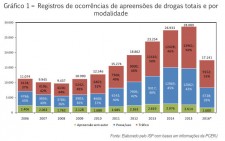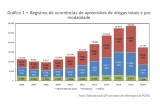
Statistics point to the effective drug prevention efforts of the Rio Civil Police
Rio de Janeiro, Brazil, May 10, 2017 (Newswire.com) - A review of drug statistics from 2010 to 2016 released by the Rio Civil Police reveals a sudden drop in drug apprehension statistics after the 2016 Rio Olympics. The February 2017 Institute of Public Security report shows that total drug apprehensions went down in 2016 for the first time in years.
Drug use and trafficking have steadily risen since 2008, but in Rio de Janeiro in 2016, the stat took its first downward plunge: a 39% decrease in drug use and trafficking, with a decrease in marijuana of 42%, cocaine 40%, and crack 51% under figures reported for 2015.
A major change was the strong measures taken by Papo de Responsa of the Rio Civil Police in the area of drug education. They reached out to tourists, locals, and youth before and during the 2016 Rio Olympics. One of their primary partners in this mammoth effort was the Foundation for a Drug-Free World, a nonprofit public benefit corporation that empowers youth and adults with factual information about drugs so they can make informed decisions to live drug-free.
Papo de Responsa worked with Drug-Free World and other nongovernmental organizations during the Rio Olympics to distribute more than one million Truth About Drugs booklets. They worked the crowds at Rio's three Live Sites, where fans watched the Olympic Games' main competitions on high-definition screens. And they ventured beyond the fan sites and into the infamous favelas to reach the most at-risk youth.
All in all, the Papo de Responsa’s activities effectively lowered drug use and trafficking in Rio by 39 percent — the first such decrease since 2008.
Source: Foundation for a Drug-Free World
Share:


